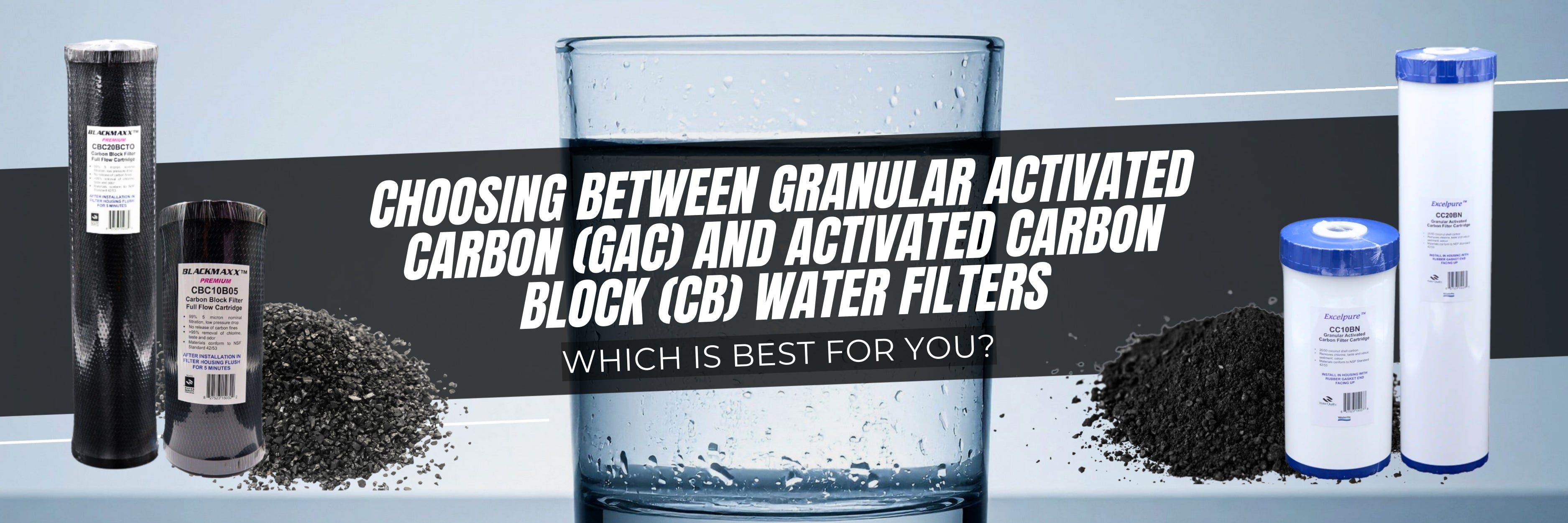Granular Activated Carbon (GAC) vs. Activated Carbon Block (CB): Making the Right Choice
When it comes to selecting a water filter, understanding the differences between Granular Activated Carbon (GAC) and Activated Carbon Block (CB) filters is essential. Both types of filters are highly effective in improving water quality, but their unique characteristics make them suitable for different applications. This blog will help you make an informed decision based on your specific needs.
The Basics of Activated Carbon Filters
Activated carbon filters are designed to remove undesirable tastes, odors, and free chlorine from potable water sources. They are commonly used as finishing filters in Ultra-Violet (UV) and Reverse Osmosis (RO) water filtration systems. While both GAC and CB filters use activated carbon media, their construction and performance vary significantly.
Granular Activated Carbon (GAC) Filters
GAC filters consist of loosely packed granules of activated carbon contained within a canister-type cartridge. Here are the key features:
- High Flow Rate: The loose granule structure allows for a higher flow rate, meaning more water can be filtered in less time.
- Increased Lifespan: GAC filters typically last longer than CB filters.
- Potential Issues: They are prone to channeling, where water bypasses the carbon granules, reducing filtration efficiency. Additionally, stationary water pockets can lead to microbiological growth and potential contamination.
Activated Carbon Block (CB) Filters
CB filters are made by grinding activated carbon into a fine powder, mixing it with a food-grade binder, and compressing it into a solid block. Key features include:
- Higher Surface Area: The compact structure offers a larger surface area for adsorption, making CB filters more effective at removing contaminants.
- Fine Filtration: Capable of filtering out smaller particles, heavy metals, and other contaminants more efficiently than GAC filters.
- Reduced Flow Rate: The compact nature of CB filters results in a lower flow rate, but this also means longer contact time with the carbon, enhancing filtration efficiency.
Comparing GAC and CB Filters
Construction and Filtration Path
- GAC Filters: Loosely packed granules allow for a higher flow rate but are less effective in fine filtration due to potential channeling.
- CB Filters: The tightly packed block structure provides superior filtration efficiency but at a slower flow rate.
Filtration Efficiency and Contaminant Removal
- GAC Filters: Effective for high flow applications but less efficient in removing fine particles and heavy metals.
- CB Filters: Superior in removing smaller particles and contaminants due to longer contact time and larger surface area.
Maintenance and Lifespan
- GAC Filters: Generally have a longer lifespan and are easier to replace. However, they require careful monitoring to prevent channeling and microbiological growth.
- CB Filters: Offer better contaminant removal but need more frequent replacements due to lower flow rates and higher filtration efficiency.
Applications and Best Uses
- GAC Filters: Ideal for applications where a higher flow rate is needed, such as in pre-filtration stages or where the primary concern is improving taste and odor.
- CB Filters: Best suited for applications requiring fine filtration and high contaminant removal, such as in the final stages of water purification systems.
Conclusion
Choosing between Granular Activated Carbon (GAC) and Activated Carbon Block (CB) filters depends on your specific filtration needs. If you prioritize a higher flow rate and longer lifespan, GAC filters are a good choice. For superior contaminant removal and finer filtration, CB filters are the better option.
Both types of filters have their place in water treatment and purification systems, often working together to provide comprehensive filtration. By understanding the strengths and limitations of each type, you can make an informed decision to ensure optimal water quality for your application.
For further assistance in selecting the right filter for your needs, contact us today.
